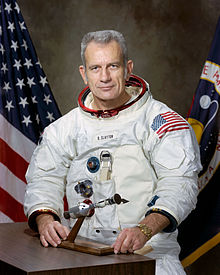Deke Slayton | |
|---|---|
 Slayton in 1973 | |
| Born | Donald Kent Slayton March 1, 1924 Sparta, Wisconsin, U.S. |
| Died | June 13, 1993 (aged 69) League City, Texas, U.S. |
| Education | University of Minnesota (BS) |
| Spouses | Marjorie Lunney
(m. 1955; div. 1978)Bobbie Belle Jones (m. 1983) |
| Children | 1 |
| Awards | |
| Space career | |
| NASA astronaut | |
| Rank | Major, USAF |
Time in space | 9d 1h 28m |
| Selection | NASA Group 1 (1959) |
| Missions | Apollo–Soyuz Test Project |
Mission insignia |  |
| Retirement | February 27, 1982 |
| Signature | |
 | |
Donald Kent "Deke" Slayton (March 1, 1924 – June 13, 1993) was an American Air Force pilot, aeronautical engineer, test pilot, and one of the original NASA Mercury Seven astronauts. He went on to become NASA's first Chief of the Astronaut Office and Director of Flight Crew Operations, responsible for NASA crew assignments.
Slayton joined the U.S. Army Air Forces during World War II, and flew in Europe and the Pacific. He left the Army after World War II, went on to receive a Bachelor of Science degree in aeronautical engineering from University of Minnesota in 1949, and later joined the Minnesota Air National Guard after working for Boeing as an aeronautical engineer. He joined the United States Air Force, and attended the U.S. Air Force Test Pilot School in 1955. In 1959, he applied to, and was selected as one of the Mercury Seven, NASA's first class of astronauts. Slayton was scheduled to pilot the second U.S. crewed orbital spaceflight, but was grounded in 1962 by atrial fibrillation, an irregular heart rhythm. In March 1972, he was medically cleared to fly and was the docking module pilot of the 1975 Apollo–Soyuz Test Project (ASTP). Slayton continued to work at NASA until 1982. He also helped develop the Space Shuttle.
Slayton died from brain cancer on June 13, 1993, aged 69.